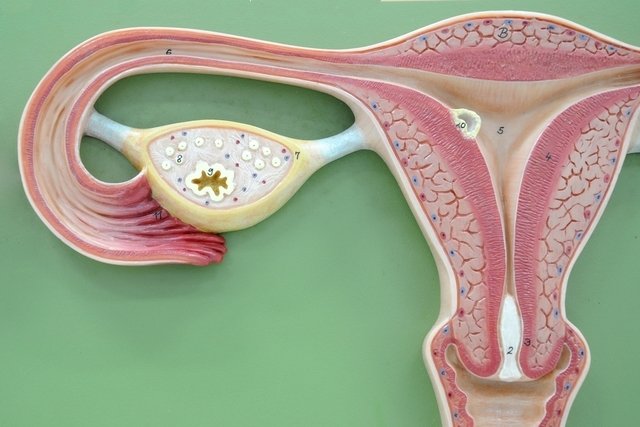Late ovulation is when ovulation occurs after the expected period, usually after the 21st day of the menstrual cycle. This late ovulation can happen just a few days later than expected or take weeks or months to happen.
Late ovulation ends up delaying menstruation and can happen even in women who have a regular menstrual period.
Generally, ovulation occurs in the middle of the menstrual cycle, which is, on average, 28 days long, therefore occurring around day 14. However, in some cases, it may occur later due to stress, thyroid problems or due to the use of some medications, for example. Learn more about ovulation.

Late ovulation symptoms
Late ovulation does not normally lead to the appearance of signs or symptoms, however it is possible that the menstrual flow is more intense, as there is greater hormonal production before ovulation occurs.
As with normal ovulation, it is common for late ovulation to see signs that indicate that ovulation is happening, such as an increase and change in cervical mucus, which becomes more transparent and elastic, similar to egg white, a slight increase in body temperature and a small abdominal pain on one side. See more ovulation symptoms.
Make an appointment with your nearest gynecologist, using the tool below, to understand more about the menstrual cycle and find out in more detail when ovulation occurs:
Taking care of your health has never been easier!
Ovulation calculator
To find out your ovulation date, enter your details into the calculator below:
Possible causes
Late ovulation is usually caused by:
- Stresswhich can have a negative impact on hormonal regulation;
- Thyroid diseasewhich influences the pituitary gland, responsible for releasing the hormones LH and FSH, which stimulate ovulation;
- Polycystic ovary syndromein which there is greater production of testosterone, which makes the menstrual cycle irregular;
- Breast-feedingin which prolactin is released, which stimulates milk production and can suppress ovulation and menstruation;
- Medicines and drugssuch as some antipsychotics, prolonged use of some non-steroidal anti-inflammatories and drug use, such as marijuana and cocaine.
Although late ovulation is often associated with psychological or hormonal situations, the delay in ovulation can be considered normal in cases where the menstrual cycle is longer than 28 days, and it is not necessary to start treatment.
Does late ovulation make pregnancy difficult?
If ovulation occurs later than normal, this does not mean that it compromises fertility. However, in people with an irregular menstrual cycle, it will be more difficult to predict when the fertile period is or when ovulation occurs. In these cases, the woman can resort to ovulation tests to identify the fertile period. Learn how to calculate the fertile period.
What to do
It is important to know the length of the menstrual cycle, because in very long cycles it is common for ovulation to occur later, when compared to the 28-day cycle, which is considered normal.
However, when late ovulation is constant, it is possible that it is due to other situations, and it is important that the gynecologist is consulted so that the cause can be identified and, thus, the most appropriate treatment indicated to regulate ovulation, which can be made with the use of hormonal medications.
If the cause is not identified but the woman wants to get pregnant, the doctor can prescribe medications that help regulate the menstrual cycle.
Bibliography
- SU, HW; et al. Detection of ovulation, a review of currently available methods. Bioeng Transl Med. 2. 3; 238-246, 2017
- CDC. Reproductive health and the workplace. Available at: <https://www.cdc.gov/niosh/topics/repro/femalereproductivesystem.html>. Accessed on 18 Jul 2023
- THE AMERICAN COLLEGE OF OBSTETRICIANS AND GYNECOLOGISTS. Fertility Awareness-Based Methods of Family Planning. Disponível em: <https://www.acog.org/patient-resources/faqs/contraception/fertility-awareness-based-methods-of-family-planning>. Acesso em 18 jul 2023
- NHS. How can I tell when I’m ovulating?. Disponível em: <https://www.nhs.uk/common-health-questions/womens-health/how-can-i-tell-when-i-am-ovulating/>. Acesso em 18 jul 2023

Sign up for our newsletter and stay up to date with exclusive news
that can transform your routine!
Warning: Undefined array key "title" in /home/storelat/public_html/wp-content/plugins/link-whisper-premium/templates/frontend/related-posts.php on line 12
Warning: Undefined array key "title_tag" in /home/storelat/public_html/wp-content/plugins/link-whisper-premium/templates/frontend/related-posts.php on line 13



